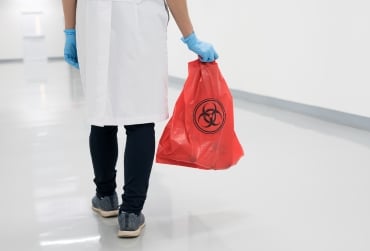All Points Medical Waste Blog
The Impact of Federal Regulations on Medical Waste Management Practices

Understanding these regulations protects both public health and your facility’s compliance status. From small practices in Martin County to large systems serving Lee County, proper adherence prevents costly violations while safeguarding communities.
Overview of Federal Medical Waste Regulations
Federal oversight of medical waste involves multiple agencies with distinct but complementary roles. This multi-layered approach ensures comprehensive protection from generation to final disposal.
Key Agencies That Regulate Medical Waste (EPA, OSHA, DOT)
The Environmental Protection Agency (EPA) governs waste classification and treatment standards. They determine what constitutes regulated medical waste and approve treatment technologies for pathological and infectious materials.
The Occupational Safety and Health Administration (OSHA) focuses on worker protection through the Bloodborne Pathogens Standard. This regulation mandates exposure control plans, training programs, and specific handling procedures for healthcare facilities.
The Department of Transportation (DOT) regulates the movement of medical waste as hazardous materials. Their packaging, labeling, and shipping requirements apply to all waste transported between facilities across Indian River County and beyond.
How Federal Rules Differ from State Requirements
Federal regulations establish minimum standards, while states can implement stricter requirements. Florida has specific regulations that complement federal oversight, particularly regarding treatment methods and disposal tracking.
States handle permitting for treatment facilities and may require additional documentation beyond federal mandates. This layered approach means facilities in St. Lucie County must comply with both federal standards and Florida-specific requirements.
The Role of Compliance in Medical Waste Management
Compliance forms the foundation of safe medical waste management. Proper adherence protects patients, staff, and communities while avoiding regulatory penalties.
Understanding OSHA Standards for Healthcare Facilities
OSHA’s Bloodborne Pathogens Standard requires exposure control plans tailored to each facility’s operations. These plans must identify tasks involving blood or other potentially infectious materials and establish protective measures.
Regular training ensures staff understand proper handling procedures, from initial segregation to final disposal. Compliance training programs keep teams current on evolving requirements and best practices.
Transporting and Treating Waste in Accordance with Federal Law
DOT regulations require proper packaging using approved containers and UN-specification boxes. Manifests must accompany all shipments, creating a paper trail from generation through final treatment.
Treatment facilities must operate under EPA-approved methods, whether using autoclaving, incineration, or alternative technologies. This ensures complete destruction of pathogens before waste enters standard disposal streams.
Environmental and Public Health Impacts
Federal regulations protect both environmental resources and community health. Proper management prevents contamination while reducing disease transmission risks.
Reducing Risks Through Proper Waste Segregation
Segregation at the point of generation minimizes exposure risks for healthcare workers. Appropriate containers ensure different waste types receive proper treatment based on their risk profile.
Color-coded systems help staff identify correct disposal methods for sharps, pathological waste, and pharmaceuticals. This systematic approach prevents cross-contamination and ensures regulatory compliance.
How Regulations Protect Workers and Communities
OSHA standards mandate personal protective equipment and safe handling procedures. These requirements protect healthcare workers from needlestick injuries and infectious disease exposure.
Environmental protections prevent contamination of groundwater and air quality around treatment facilities. Communities in Okeechobee County and throughout Central Florida benefit from these comprehensive safeguards.
Challenges and Best Practices for Compliance
Maintaining compliance requires ongoing attention to changing regulations and staff training needs. Common challenges include documentation gaps and inadequate segregation practices.
Common Compliance Mistakes to Avoid
Mixing regulated and non-regulated waste creates unnecessary disposal costs and potential violations. Inadequate staff training leads to improper handling and increased exposure risks.
Missing documentation can result in significant penalties during regulatory inspections. Manifest errors or incomplete exposure control plans frequently trigger compliance issues for healthcare facilities.
Implementing Training and Documentation Programs
Regular training ensures staff understand current requirements and proper procedures. Annual updates keep teams informed about regulatory changes and emerging best practices.
Comprehensive documentation systems track waste from generation through disposal. This creates an audit trail that demonstrates compliance and supports continuous improvement efforts.
How All Points Medical Waste Ensures Full Regulatory Compliance
Navigating complex federal requirements requires expertise and experience. Professional waste management services provide the knowledge and systems necessary for complete compliance.
Adhering to Federal, State, and Local Standards
All Points Medical Waste maintains current knowledge of evolving regulations across all jurisdictions. Our team monitors changes in EPA, OSHA, and DOT requirements to ensure client compliance.
We provide guidance on proper segregation, container selection, and documentation requirements. This comprehensive approach addresses all regulatory aspects of biomedical waste management.
Providing Reliable, Certified Waste Disposal Services
Our certified treatment facilities operate under strict EPA guidelines using approved technologies. Complete manifest tracking ensures proper documentation from pickup through final disposal.
Regular pickup schedules prevent waste accumulation that could create compliance issues. Professional handling reduces liability while maintaining the highest safety standards for facilities throughout our service area.
Federal regulations establish the framework for safe medical waste management, but proper implementation requires expert guidance and reliable service. Call All Points Medical Waste at (772) 600-4885 or complete the form on this page today!

